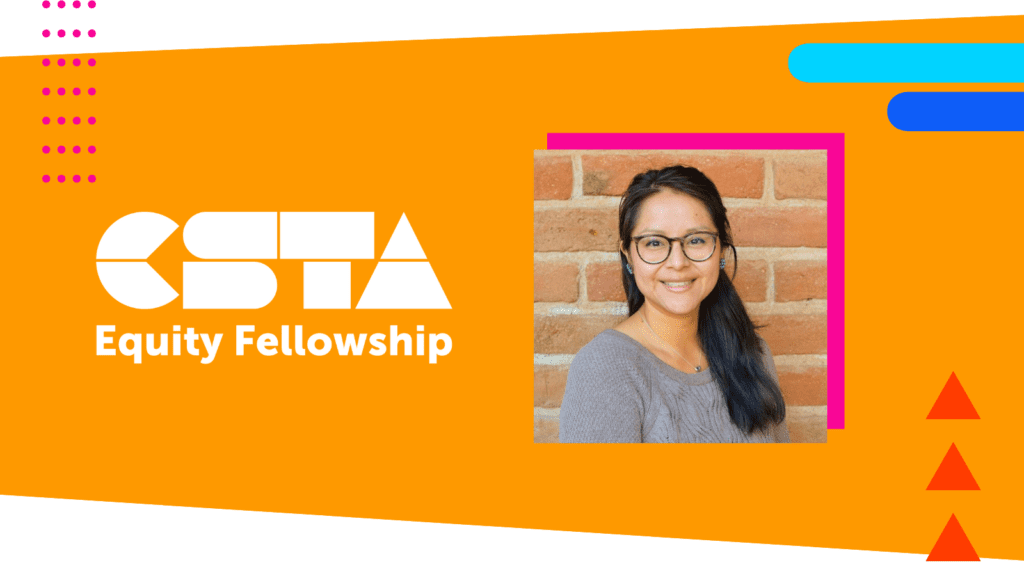Yá’át’ééh! Shí éí Angela Marquez yíníshyé’. Táchii’nii nishłį́, Tł’ááshchí’í ’éí bá shíshchíín. Kinyaa’áanii ’éí dashicheii áádóó Tábąąhí ’éí dashinálí. Angela Marquez is Diné, indigenous to Leupp, AZ, on the Navajo Nation. She works in many roles supporting and advocating for Indigenous students in CS education, primarily helping organize the 4 Corners CS Convening, a free conference for Indigenous and Indigenous-serving CS educators. Grounding all her work in maintaining Relational Accountability (Wilson and Wilson, 1998), Angela works to empower CS students and professionals in partnership with tribal communities. From Angela’s lived experience of needing to leave her homeland to obtain degrees in higher education and not having the option to return home to work professionally, Angela understands the unique opportunity computer science education (CS Ed) offers for Indigenous peoples to serve their communities while also having the choice to return home, to return to the language, to return and serve our families.
In her career, Angela has prioritized using mathematics and computer science as a way for Indigenous students to sustain, support, and connect with their culture and heritage. She says, “Serving one’s community through language revitalization efforts is possible with CS, when native youth can take the lead.” In response to requests from schools for paid internship opportunities, she is currently co-developing an Indigenous Data Sovereignty and Indigenous Data Governance (IDSov/IDGov) Youth Empowerment Course with the Pascua Yaqui Tribe. Supporting Indigenous communities in asserting authority over their digital cultural knowledge and lifeways is a way for today’s Indigenous student population to learn how they can serve their peoples in this digital age.
Supported by a grant from Google, Angela worked collaboratively with various CS Ed organizations throughout the Southwest Region to plan the 4 Corners CS Convening, which brought together Indigenous and Indigenous-serving CS educators to share ideas and mutual accountability for how to best serve their student populations. The conference offered a unique opportunity to highlight, and bring in professionals from, various educational institutions and Indigenous tech companies in the area, and attendees were encouraged to engage further with such organizations in the future on behalf of their Indigenous students.
At the center of Angela’s work rests the idea of Relational Accountability, which foregrounds personal relationships and seeks to build life-long kinship ties with tribal communities. From Angela’s professional experiences at the Data Sciences Academy, engaging with educators and schools in, at minimum, an academic year of professional development community building, is how we can start to build a network that truly supports today’s educators. “We enter into relationship with one another,” says Angela, “and seek out how we can partner to best serve our students.” Angela endeavors to directly meet the needs of communities through place-based project building and intentionally initiating intergenerational partnerships.
Angela’s team performs consistent outreach to tribal communities, sharing information about their programs through chapter house meetings, district planning meetings, and open house events. When introducing themselves and their work to tribal education departments, Angela’s role, as a good relative, begins with listening. Angela says, “Our goal is to support community-initiated programming to ensure we rightly honor our tribal partners and directly address community values and priorities in computer science education.”
As a member of the 2024 CSTA Equity Fellows cohort, Angela is eager to learn more about the resources that already exist, or can be created, to address some of the main goals of the educators involved in the various programs Angela helps co-develop. She maintains solidarity with other CS educators, learning about the unique challenges their students face and sharing knowledge of how to support CS students from Indigenous and other underrepresented backgrounds.
In her fellowship year, Angela hopes to support community-led initiatives with sustainable, long-term student-led projects, tiered student mentorship programs in which older CS students mentor and lead younger ones, and programs to align the goals of CS educators and language and culture educators. Additionally, Angela is co-developing the forthcoming Tech Swap, a mutual aid network to redistribute Ed Tech to all students. The Tech Swap launches with the upcoming CSTA National Conference 2025. All together, she dreams of providing context for tribal communities to directly engage with and empower our youngest relatives in computer science, starting with directly investing in today’s CS education community with IDSov/IDGov learning.
To Angela, she says, “equity feels like being able to rest, assured that our native youth are provided the option to come home and work in a space that is created by and for Indigenous communities.”

